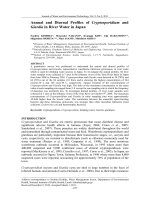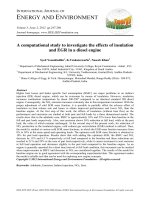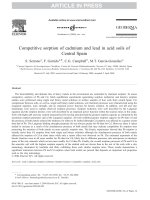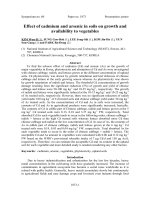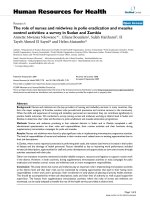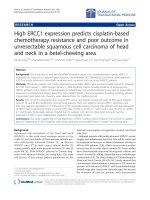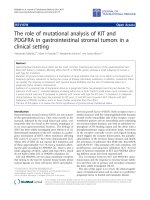Application of RS and GIS in disaster managment
Bạn đang xem bản rút gọn của tài liệu. Xem và tải ngay bản đầy đủ của tài liệu tại đây (3.37 MB, 13 trang )
Course Outline (1)
AT09.98
Applied GIS and Remote Sensing
for Disaster Mitigation
1. Introduction
1.1 Overview of Natural Hazards
1.2 Applications of GIS and RS to Disaster Mitigation
#1 Introduction
2. Hazard Analysis
2.1 Seismic and Tsunami Hazard
2.2 Volcanic Hazard
2.3 Flood Hazard
4 September, 2002
Fumio YAMAZAKI
3. GIS Data and Inventory Development
3.1 GIS Data and Digital Maps
3.2 Data Acquisition for Built Environment
/>SEC/SCE and STAR/SAT, AIT.
1
2
Course Outline (2)
Class Schedule
1)
2)
3)
4)
5)
6)
4 September Lecture
Introduction
11 September Lecture + Lab Seismic Hazard
18 September Lecture + Lab Tsunami and Volcanic Hazard
25 September Lecture + Lab
2 October Lecture + Lab
9 October Lecture + Lab
16 October Midterm Exam
7) 30 October Lecture + Lab Lecture on Flood by Dr. Dutta
8) 6 November Lecture + Lab
9) 13 November Lecture + Lab
10) 20 November Lecture + Lab
27 November Final Exam
4. Damage Assessment
4.1 Damage Assessment Methodologies
4.2 Early Damage Assessment
4.3 Examples of Damage Assessment Tools on GIS
5. Damage Detection and Disaster Monitoring
5.1 Satellite Remote Sensing for Damage Detection
5.2 Airborne Remote Sensing for Damage Detection
5.3 GPS and Real-time Monitoring
3
4
References
Grading System
Lecture Note (PPT files) on the Web
/>
The Final grade will be computed according to the
following weight distribution:
Mid-Term Exam 35%
Final Exam 35%
Laboratory 30%
Related reference books and materials
– P.A. Longley, et al.: Geographical Information Systems and Science,
John Wiley & Sons, Inc., 2001.
– T. M. Lillesand and R. W. Kiefer: Remote Sensing and Image
Interpretation, Fourth Edition, John Wiley & Sons, 2000.
–
United Nations Initiative towards Earthquake Safe Cities: Risk
Assessment Tool for Diagnosis of Urban Areas against Seismic
Disasters, CD-ROM, .
–
Canada Centre for Remote Sensing: Fundamentals of Remote
Sensing: />6
5
Hazard, Risk and Disaster
Hazard: Circumstance of the
occurrence of an event. Probabilistic
Risk
Hazard
Event: A specific natural phenomenon
(e.g., earthquake, flood), an accident or an
incident (e.g., traffic accident, terror )
Deterministic
Event
System to
be affected
Loss (effect)
Vulnerability; Probabilistic
Loss/effect due to an event
Deterministic/Probabilistic
Risk: Probability of occurring loss to a system Probabilistic
Disaster: An event which causes significant losses. Deterministic7
Probabilistic Modeling of Load and Resistance
Probability Density Function
Closed-book examinations are given both in the midterm and finals.
Load: L
(hazard)
Resistance: R
(vulnerability)
Probability of Failure
Pf = P(L>R)
l : a specific value of L
l
pR(l) : the probability such that R< l
L
R
8
Major natural catastrophes in the 20th century
1. Introduction
Munich Re Group:World of Natural Hazards, CD-ROM.
1.1 Overview of Natural Hazards
Earthquakes, Tsunamis
Geological Hazards
Volcanic Eruptions
Tropical / Winter Storms
Floods, Droughts
Hydro-Meteorological
Hazards
Thunder Storms, Tornados
9
10
Natural Disasters in the World (Type, Period)
Source: Center for Research on the Epidemiology of Disasters, Louvain Catholic University
(CRED)
Disaster: more than 10 people killed or more than 100 people affected
WC-21 <1975-1999>
Number of Disasters(Period/Type)-World Total
1,400
1,200
Wind storm
Number of Disasters
1,000
Costly Natural Catastrophes in the
20th
Wild fire
Wave/surge
Volcano
800
Slide
Insect infes-tation
600
Flood
Extreme temp
Earthquake
400
Century
Drought
200
0
1975-79
1980-84
1985-89
1990-94
1995-99
P er iod
11
12
Amount of Damage in the World (Type,
Period)
Breakdown
in continent
WC-24 <1975-1999>
Amount of Damage(US $)(Period/Type)-World Total
W C -2 6 < 1 9 7 5 -1 9 9 9 >
Nu mb er of P eople Killed-W orld T ota l
Europe
3%
Total=1,552,985
Oceania
0%
Africa
37%
x US $ 1,000
450,000
400,000
Wind storm
D a m a g e ( M illio n U S $ )
350,000
Asia
51%
Wild fire
Americas
9%
Wave/surge
300,000
Volcano
250,000
Slide
Insect infes-tation
200,000
Flood
150,000
People killed
Africa
Americas
Asia
Europe
Oceania
W C -27 < 1975-1999>
T otal Nu mber of A ffected P eople-W orld T otal
Extreme temp
Earthquake
100,000
Total=3,772,452,863
Europe
Oceania
Africa
1%
1%
6%
Americas
4%
Drought
50,000
0
1975-79
1980-84
1985-89
1990-94
1995-99
Perio d
Losses due to natural disasters are increasing…
Asia
13
88%
People affected
Africa
Total= 781,673
A C -2 < 1 9 7 5 -1 9 9 9 >
Nu mb er of P eople Killed-A sia T ota l
0%
Earthquake
Wind storm
48%
32%
Earthquake
Extreme temp
Flood
Insect infestation
Slide
0%
Oceania
Wave/surge
Wave/surge
Volcano
Europe
Volcano
Wild fire
1%
14
Asia
Fault Rupture in
the 1999 Chi-Chi,
Taiwan EQ
Drought
Drought
Americas
Flood
Slide
Wild fire
Extreme temp
15%
2%
2%
Wind storm
Insect infes-tation
0%
0%
A C -4 < 1 9 7 5 -1 9 9 9 >
A mou n t of Da ma g e(US $ )-A sia T ota l
Wave/surge
0%
Wild fire
7%
Wind storm
16%
Drought
Earthquake
1%
44%
V olcano
Earthquake
Extreme temp
0%
Flood
Slide
0%
Insect infes-tation
0%
Drought
Insect infestation
Slide
V olcano
Flood
Extreme temp
31%
1%
Total= 447 x 109 US$
Wave/surge
Wild fire
Wind storm
15
16
The Gujarat, India EQ on January 26, 2001
Urban Area
Rural Housing
Plate Tectonics and Earthquakes
17
18
Tsunami
Earthquake Hazard
19
20
Eruption of
Mt. Usu, Japan,
March 2000
Tsunami Hazard
21
22
Japan Hit by Typhoon Pabuk, August 21, 2001
Active Volcanoes
/>
23
24
Tropical and Winter Storms
Tropical Storm
25
26
Thai flood death toll rises to 164
August 15, 2001
/>27
Major
Floods
28
Map of torrential rain and seasonal focus
Tornado
29
Tornado and Lightning Hazard
30
Lightning
Exposure to Natural Hazards
(1) Thailand vs Indonesia
Thailand
31
Indonesia
32
Exposure to Natural Hazards
(3) China vs India
Exposure to Natural Hazards
(2) Japan vs USA
China
USA
Japan
India
33
34
1. Introduction
GIS and RS in Disaster Management
1.2 Applications of GIS and RS to Disaster Mitigation
Cycle of Disasters
Earthquakes, Tsunamis
Pre-Event Æ Event Æ Post-Event
★
Volcanic Eruptions
Floods
Hard Tech.
Tropical Storms
Mitigation
Restoration/Reconstruction
Disaster Information Systems
Tornados, Thunder Storms
Man-made Disasters (e.g., oil spills, terrors)
35
Soft Tech.
Preparedness Response
GIS and RS
36
Remote Sensing
Satellite
Optical Sensor/SAR
700-900km
Platforms and Sensors for RS
Space Shuttle
Airborne SAR
185-575km
Aerial Photography
Objectives: Land cover, Urban modeling, Damage detection
Data Type: Spatial Information (2D, 3D) Æ GIS
Weather and Day Light: Optical Sensor, SAR
Action
Prompt
Area
Resolution
Small
High
10-12km
・Aerial Television
・Aerial Photography
・Airborne SAR, LIDAR
1.2-3.5km
Aerial Television
・Satellite SAR, Opt. Sensor
0.3km
37
Few Days
Large
Coarse
38
Landsat-7 ETM+ image after the Kocaeli, Turkey
earthquake on 17th August, 1999
RGB= bands 7, 5, 2
Image acquired on
18th August, 1999
39
40
/>
IKONOS Image of Bhuj, India on Feb. 2, 2001
IKONOS Image
Lower Manhattan,
Post Attack
9.15.2001
Resolution: 1m (Panchromatic), 4m (Multi-Spectral)
41
42
/>
Damage Assessment using GIS
Heavy
Damage Classification
100%
W ■
80%
Damage Ratio
Building
Inventory
90%
RC ●
70%
S ○
60%
LS ▲
50%
40%
30%
Shake Map Development for
the 1995 Kobe EQ based on
Building Damage Data
20%
10%
0%
0
20
40
60
80
100
120
140
160
180
PGV (cm/s)
Geological
Data
Seismic Hazard
Vulnerability
PGV (cm/s)
150 120 - 150
90 - 120
60 - 90
30 - 60
- 30
No Building
43
Damage
Estimated Peak
Ground Velocity
44
Development of building inventory on GIS is
most costly in seismic risk assessment.
Remote sensing is expected to serve this task…
Microscopic GIS Database for Risk Assessment
◆Building
◆BuildingInventory
Inventory
◆Estimated
◆EstimatedDamage
Damage
◆Information
◆Informationon
on Family
Family
◆Preparedness
◆Preparedness
45
Landsat image of Mt. Fugen, Japan,
before and after the eruption
46
NOAA/AVHRR
Images of Flood
in Changjiang
(Yangtze) River,
China
/>
1.1 km resolution
R, B: Visible band
G: Near-infrared band
/>china98flood/yangtze/yangtze.html
April 15, 1988
September 17, 1992
47
48
Hurricane Loss Estimation Model on GIS
Area of stricken by forest fire, Mongolia
JERS-1 OPS, RGB=231
/>
/>
Wind Hazard
Wind Effects
Wind loading effects
Building/facility response models
Structure/Physical
Damage
HAZUS (hazard US)
Risk Assessment
and Loss Analysis
49
Oil outflow to Tokyo
Bay on July 2, 1997
SPOT-2 (HX) image
50
Steps in assessing and mitigating losses
due to natural disasters
Inventory
Collection
Field Survey,
RS, GIS
Before Oil Outflow
August 21, 1996
Natural Hazards
Impact Assessment
GIS
/>
Hazard
Identification
Risk Evaluation &
Engineering Assessment
Hazard data,
RS, GIS
After Oil Outflow
July 3, 1997
Mitigation
51
52
